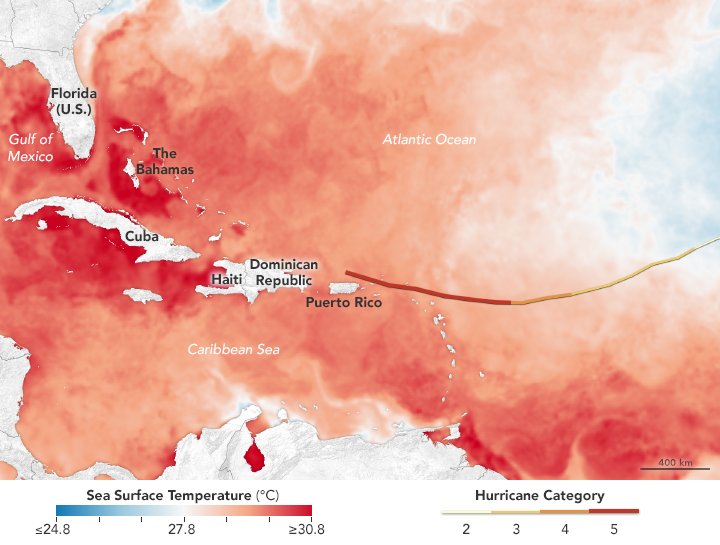The following article by Philip Bump was posted on the Washington Post website September 9, 2017:
Update: On Friday, during an interview with CNN, EPA administrator Scott Pruitt said that it was inappropriate to discuss the effect of climate change on the intensity of Hurricane Irma.
“What we need to focus on is access to clean water, addressing these areas of superfund activities that may cause an attack on water, these issues of access to fuel,” he said. “Those are things so important to citizens of Florida right now, and to discuss the cause and effect of these storms, there’s the… place (and time) to do that, it’s not now.”
As EPA administrator, Pruitt has given no indication that he thinks there’s ever a time to consider the role of climate change. The article below originally ran on Thursday.
Right now there are three hurricanes spinning in the Gulf of Mexico and North Atlantic: Irma, Jose and Katia.
By itself, the existence of those storms isn’t clearly linked to the warming climate. Even once you consider Hurricane Harvey that hit at the end of last month, there have been other years with a similar string of hurricanes.
What’s remarkable about these hurricanes, though, is their strength. Harvey dropped more precipitation over Texas than any storm in recorded American history. Irma has been a Category 5 storm for more than two days, and maintained wind speeds of more than 185 miles per hour for a longer period than any storm on record.
How’s that linked to climate change? Allow NASA to explain.
Over time, sea temperatures have steadily risen, a function, scientists believe, of increasing global temperatures due to the greenhouse effect.
As you’re probably aware, it’s not only sea temperatures that are increasing. Temperatures on land have also risen over the past few decades, as carbon dioxide, methane and other gases trapped in the atmosphere prevent heat from escaping into space.
Those increased temperatures have effects on a lot of things, including precipitation. Climate change models tell us that, as the world warms, we’ll see longer, deeper droughts and stronger precipitation events (like Hurricane Harvey).
In July, the Pacific Northwest received much less rainfall than is normal. Some parts of Washington and Oregon are in a drought.
As of Thursday morning, there were 51 large, uncontained wildfires in the United States, heavily centered in that area.
Increased wildfire risk is another thing that we’d expect to see from climate change. So far in 2017, nearly 8 million acres have burned. The annual average from 2006 to 2016 was 5.5 million.
It’s a moment, in other words, when a lot of the predictions of the dire effects of increased global temperatures are being reinforced. In a warmer world, we’d expect to see stronger hurricanes and better conditions for wildfires. As the world continues to warm, the risk of those things happening are expected to grow.
Each federal agency has a role to play in preparing for the warming climate. The military, for example, has worked to ensure that its facilities around the world are prepared for rising sea levels. But no agency has a more central role than the Environmental Protection Agency which, under President Barack Obama, took stronger action to regulate the emission of greenhouse gases from automobiles and power plants, the two most significant drivers of our country’s emissions. Obama also agreed to an international pact aimed at reducing emissions from other countries as well.
Once Jan. 20 rolled around, though, the EPA was upended. President Trump nominated Oklahoma attorney general Scott Pruitt to run the agency, a man who had repeatedly sued the EPA in an effort to block its regulations targeting the oil and gas industry in his state. In an interview in March, Pruitt denied the scientific consensus that human activity was driving the warmer climate — a denial that suggested he would curtail the EPA’s efforts to limit greenhouse gas emissions.
Once confirmed by the Senate, Pruitt got to work reshaping the agency in precisely that way. In April, the organization’s page on climate change was removed; in May, a page focused on educating children was as well. Pruitt’s the driver of a government-wide effort to question climate science by positioning it against the views of the business community. Even the EPA museum may be overhauled to play down climate change.
Pruitt’s also shifted the EPA’s focus and wound down its ability to do its work. Hundreds have left the agency. The Washington Post reported this week that any grants awarded by the agency are reviewedby a political aide who looks for mentions of climate change. An attempt to suspend a rule implementing new emissions standards on oil and gas wells was blocked by a court, but Pruitt has helped drive a slew of rollbacks on environmental policies put in place by the Obama administration. Among those were the plan to limit emissions from existing power plants and delaying new automotive fuel efficiency standards. Pruitt also stood next to Trump as the president withdrew from the Paris climate accord.
“The future ain’t what it used to be at the EPA,” Pruitt said at the Conservative Political Action Conference earlier this year. That’s clearly true. But that shift in focus probably has repercussions for the future of the rest of the planet as well. The United States is one of the largest emitters of greenhouse gases and one of the largest emitters on a per capita basis.
Without slowing the emission of greenhouse gases, scientists expect the effects of the warmer climate will increase. Warmer oceans fueling more powerful hurricanes. Deeper droughts, providing more fuel for wildfires. Hotter temperatures, higher seas, bigger storms. The effects of climate change are already being felt, but concerted action, we are told, can shift us toward a less severe future.
That future, it seems, ain’t what it might have been.
View the post here.







